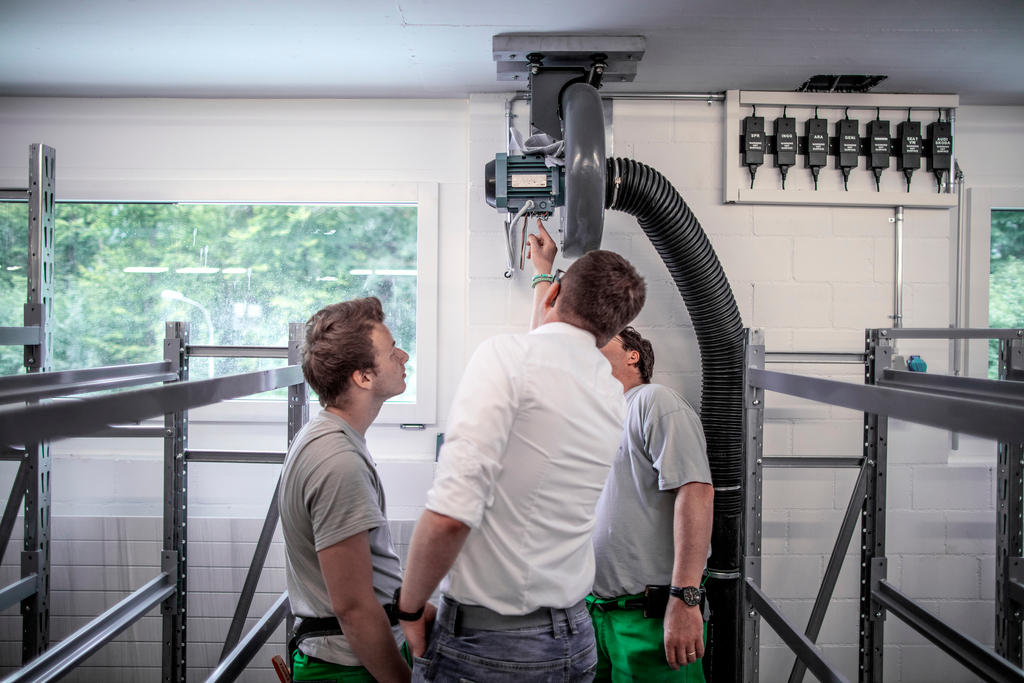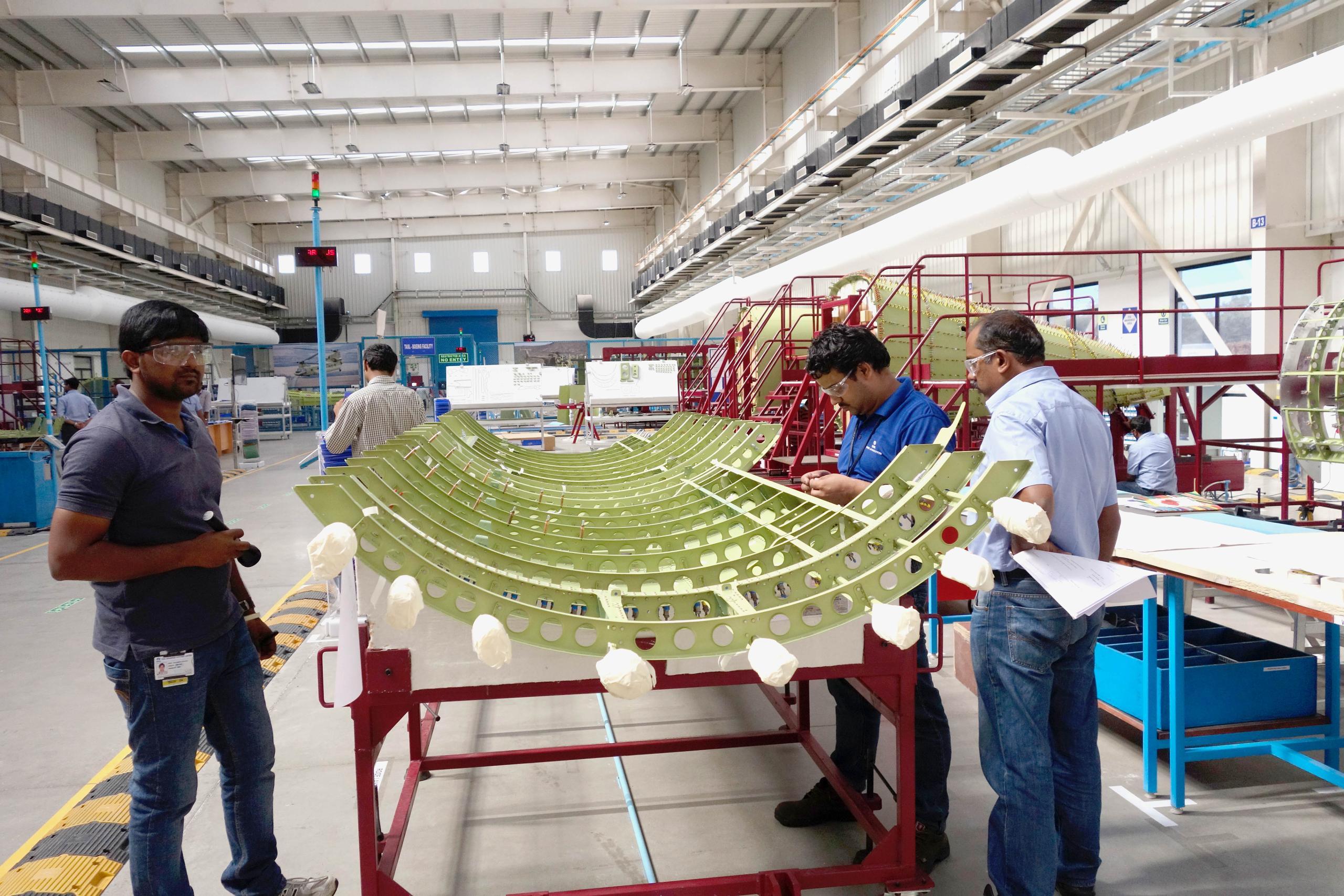Swiss support for vocational training monopoly in India questioned

Has Switzerland’s eagerness to export its vocational training and education model to India led to an unsatisfactory compromise that ultimately hurts the battle against poverty: granting a private company exclusive rights to the curriculum developed with Swiss taxpayers’ money?
This year, India and Switzerland will celebrate 70 years of a Friendship Treaty that was signed by the two countries in 1948. A decade ago, the 60th anniversary of the Treaty was commemorated by launching a pilot projectExternal link called the Swiss Vocational Education and Training Initiative India (SVETII). The objective of the project was to train young Indians under the Swiss apprenticeship model to ensure Swiss companies in India had the skilled workers they needed. It was touted as a win-win outcome.
The timing of the SVETII couldn’t have been better. It helped establish Switzerland’s reputation in India as a leader in vocational education. As the Swiss pilot project was drawing to a close, the Indian government created a Ministry of Skill Development and Entrepreneurship in 2014. The minister in charge signed a memorandum of understanding with Switzerland in 2016 to cooperate in skills development for a period of three years.
The structure of the SVETII project changed in 2012, shifting responsibility for its coordination to a private company called SkillSonicsExternal link. With an office in Zurich and Bangalore, the firm received close to CHF685,000 ($693,563) in public funds for 2012 and 2013 to train the trainers of the Indian apprentices. In essence, what started as a Swiss government-led project became a self-financed scheme managed by SkillSonics. The company was granted the rights to offer the course with material provided by the publicly-funded Swiss Federal Institute for Vocational Education and Training (SFIVET). After completing the training, participants receive a SFIVET certificate from SkillSonics.
This transformation from a public project to promote vocational education in India into a business was not to everyone’s advantage. It hampered scalability in a nation where a fifth of the population lives below the poverty line, according to official estimates. When a Swiss charitable organisation called the Joshi FoundationExternal link tried to get access to the SFIVET courseware for its Skills University in Rajasthan it was in for a surprise.
“We were told it was translated by SkillSonics for India and they have the rights for the whole country. We asked SkillSonics how much it would cost but the price was much too high,” Markus Gmeiner, CEO of Joshi Foundation told swissinfo.ch.
Gmeiner’s non-profit organisation had to develop their curriculum from scratch despite the existence of a publicly-funded courseware that could be used as a template and adapted to local needs.
“At the moment, even if we double our fees we will not be able to cover our costs,” says Gmeiner.
Privatised model
The downside of “privatisation” of the Swiss vocational training model in India was also raised by the Switzerland’s former official price watchdog Rudolf Strahm.
“The SkillSonics sales model is the privatisation of a vocational training model that has always been regarded as a public-private partnership product in the countries of origin, i.e. Switzerland, Germany and Austria, and that is precisely why it was so successful,” he wrote in the 2016 edition of the Caritas AlmanacExternal link that focused on exporting the VET model as means of alleviating poverty.
In his contribution entitled “Exporting the professional training model: Ideals and reality”, Strahm specifically pointed out that the publicly funded training curriculum must be offered to the Indian government free of charge if Switzerland expects it to be recognised and adopted in the subcontinent.
Even the assessment report of the SVETII pilot project acknowledged the overreliance of the project on SkillSonics by listing the “fragile organisational set up” as one of its main weaknesses from a sustainability point of view.
“The Initiative faces the lack of an institutionalised VET partnership of the corporate sector, public authorities, and schools in India that would be needed to assure a robust organisational set-up. Thus, the Initiative strongly relies on SkillSonics as a professional project management supported by Swissmem, SFIVET, and of late NSDC,” says the report.
But this heavy reliance on SkillSonics is a part of the company’s business model. Skillsonics has estimated that it would need between 20,000 to 30,000 SVETII trainees every year for the project to be successful in the long run. The only way this is possible appears to be through channelling more money into the same model.
“Investing in vocational education and training has to be recognised as a prerequisite for a high-quality work force. It includes investing in infrastructures and personnel, sharing the running costs of the training as well as the facilitating and coordinating activities of SkillSonics,” says the report.
In addition, of the seven recommendations made in the assessment, the need for a partner like SkillSonics was stressed, even if SkillSonics wasn’t mentioned explicitly.
“A professional management by a strong local partner is a precondition for successfully implementing such an initiative,” states the assessment report which relied heavily on interviews from project partners selected by SkillSonics.

Response
SkillSonics CEO Prasenjit Kundu acknowledges that SFIVET signed exclusive cooperation agreements with SkillSonics. However, he states that the curricula were part of a collaborative effort and the company “is open to consider requests from other organisations for the sharing of curricula which it has developed together with its Swiss partners”.
According to Kundu, SkillSonics does not technically license the curricula as such but its revenue model is based on “licensing proprietary courseware and providing additional services, such as training delivery, trainer, assessor and expert training, assessment and certification”. He also states that the prices charged for his firm’s services are fair.
“SkillSonics (and its partners) license their courseware and provide their services at competitive prices. Charges vary depending on the type and duration of the program/courseware and the number of trainees,” says Kundu.
There are signs that SkillSonics’ influence may be waning. Partners in the Swiss vocational training field are reconsidering the choice of the firm as a key player in India.
“Despite the important public funding, the objectives in terms of numbers of apprentices and companies have been clearly missed by SkillSonics,” Erik Swars, head of international relations at SFIVET told swissinfo.ch.
Sustainability is a key principle for cooperation projects like the one in India, and this is achieved, according to SFIVET’s director, Cornelia Oertle, “through the transfer of the expertise and the coordination lead to the local partners”.
But Swars wonders whether the right choice was made in India. “It has to be questioned if a private company like SkillSonics can fulfill this role and is able to represent the Swiss VET-system with exclusive rights in India.”
The future of the Swiss VET Initiative in India has a lot hinging on how it is implemented.
SkillSonics has not just benefited from being a partner in the Swiss pilot project. Thanks to its involvement in the pilot, the company was able to secure a INR225 million ($3.3 million) soft loan from the Indian National Skills Development Corporation (NSDC) in 2013 to scale up its activities. SkillSonics has already accessed almost half this amount, according to the NSDC.
“We see considerable demand for advanced technical/manufacturing courses to be offered through the Swiss dual education model in India,” said Abhishek Hegde, head of business development at NSDC. “SkillSonics has created content tailored to India’s needs and is now well positioned to address a much wider market.”

In compliance with the JTI standards
More: SWI swissinfo.ch certified by the Journalism Trust Initiative





You can find an overview of ongoing debates with our journalists here. Please join us!
If you want to start a conversation about a topic raised in this article or want to report factual errors, email us at english@swissinfo.ch.